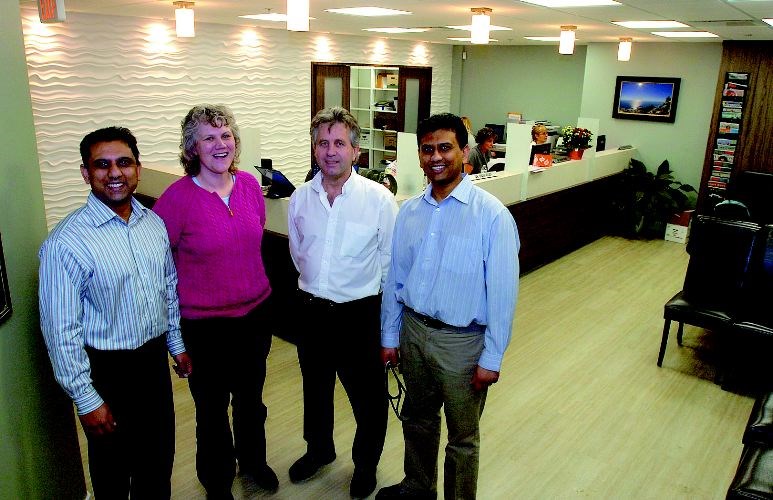A city that trains its own doctors gains benefits, as can be seen in the number of physicians that have remained in northern British Columbia since the Northern Medical Program (NMP) was established.
In 2004 the first class of medical students from the NMP hit the books at UNBC and 24 of those students graduated with medical degrees in 2008.
Now, two years later, about half that class has their two-year residency training behind them and have struck off in different directions as full-fledged family doctors.
The other half of that class is still going to school learning to be specialists.
At least three of the new family doctors are practicing in Prince George and another in Fort St. John.
And the City of Prince George has 73 family doctors while the entire Northern Health Authority boasts 314 general practitioners (GP).
"We're working with new lines of action and practices to examine gaps that may exist in primary care to create made-in-Prince George solutions to provide service for all," said Northern Health vice-president Dr. David Butcher.
"Prince George was a natural to be chosen as one of three provincial prototypes to begin working on providing access to a family physician for each citizen who wants their own doctor."
A recent Canadian Institute for Health Information report shows the 68,100 practicing physicians across Canada represent a major increase in national numbers, and a main attribution to that increase are training programs like the NMP that is now churning out between 24 and 32 new doctors on an annual basis.
University Hospital of Northern B.C. (UHNBC) offers 84.45 specialists which outnumber the GPs in the city, but that's because UHNBC is the regional hospital that serves Northern Health's (NH) population of more than 300,000.
Does Prince George have enough doctors to serve our population of about 75,000?
Butcher said what's more important are the new strategies being undertaken to ensure residents are served and don't fall between the cracks.
Prince George is one of three B.C. cities where a prototype program called Division of Family Practice is underway, said Butcher.
He said the initiative ensures that every British Columbian has the opportunity to access and benefit from a strong, deeper relationship with a family physician, including those who may be hard to serve in traditional practice settings.
The different components of the program provide primary care for inpatients who do not have access to a family doctor with hospital privileges, long-term care for patients in residential care facilities, and patients in family practices along with the entire population of Prince George.
Electronic, medical-record systems across the region, training programs for medical students and residents and after-hours primary care - like walk-in clinics - are all part of the strategy.
Developing and actively using an electronic, medical-record system across the region is highly effective for providing proactive population-based care, developing training programs for medical students and residents and establishing a non-hospital-based after-hours service to improve patient access to family physicians.
Membership in the Prince George Division of Family Practice is inclusive and available to all family physicians practicing primary care in the community, and more than 70 per cent of Prince George physicians are members.
Meanwhile, recruitment of physicians is ongoing by NH and 2010 has been fruitful, according to Butcher.
"Six family doctors joined our medical staff as well as two GP's who are specialists in emergency medicine.
"We also acquired two anesthetists, a psychiatrist, a cardiologist, an endocrinologist, a nephrologist (kidney), a respirologist and a urologist. We are also anticipating two radiologists arriving in 2011," said Butcher.
"The good news about these recruitment's is that our departments in respiratory, anesthesia and internal medicine are almost at capacity, and psychiatry is starting to improve.
"We're moving away from reactive to proactive recruitment by looking at the needs for the next five years."
The 2012 opening of the BC Cancer Agency Centre for the North will require specialized staff to care for cancer patients, and that recruitment is well under way.
Dr. Robert Olson is the first of four radiation oncologists that will be needed, while a medical oncologist is in the recruitment pipe to supplement the work of Dr. Winston Bishop, a long-time Prince George physician.
Three medical oncologists will be needed when the centre - now under construction at UHNBC - opens in Sept., 2012. The first, Dr. Suresh Katakkar, has just been hired.
Oncologists are members of the provincial Systemic Therapy program team for the BC Cancer Agency.
The CIHI report said, due to an increase in physician numbers clinical payments to doctors are also on the rise, reaching more than $17 billion in 2008-09 which represents a 9.6-per-cent increase over the previous year.
Although the increases in payments to doctors places B.C. among the lowest in Canada at 3.9 per cent (compared to 13.4 per cent in Quebec and 11.9 per cent in Ontario), a spokesperson from the BC Medical Association says doctors across the nation are paid by different methods, so it's like trying to compare apples to oranges.
Although fee-for-service payments through Medical Services Plan are still the main kind of remuneration in B.C., the spokesperson said B.C. doctors also receive "targeted funding" for group disease-management care for those with conditions like diabetes or heart-related conditions, and noted that a number of provinces are beginning to include forms of targeted funding.



